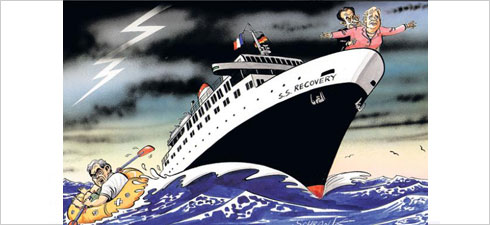If the statistics published on 13 August are to be believed, France and Germany are beginning to emerge from the recession. France's INSEEand Germany's Statistisches Bundesamt both announced an increase of 0.3% in GDP in the second quarter (over results posted for the previous quarter), which upset the alarmist forecasts of economic commentators. Exports played a role in the recovery in both countries. "In France, exports increased by 1%, buoyed by an exceptional increase in car sales (+11%), which have benefitted from scrappage schemes in most European countries," explains the French business daily La Tribune.
Not good news all round
But growth has not returned everywhere in the EU, and the figures for some countries, especially Italy and Spain, remain very weak. According to forecasts, Spanish GDP in the second quarter of 2009 will fall by 0.9%, which leads Spanish dailyEl Periódico to wonder if Europe's economy is experiencing "an uneven recovery." Poland has to contend with low consumer spending prompted by an increase in unemployment, which could reach 13% by the end of the year, observes economist Piotr Kalisz in Gazeta Wyborcza. In the Czech Republic,Lidové Noviny welcomes the French and German figures, but nonetheless remains cautious, noting that the growth "is reason for a more positive mood, but it does not mean that the coming months will be like a walk on the beach." The Czech daily further reports that the Czech economy is "in free fall," with the Republic's national statistics office about to announce a second-quarter decline in GDP of 4.9% on 15 August.
On the other side of the Channel, signs of recovery in Germany and France have prompted severe criticism of the Labour government's economic policy. "It must be galling for Gordon Brown that the big European economies, with whose leaders he has repeatedly clashed over how to beat the recession, are returning to growth more quickly than Britain," notes The Independent. This view is shared by The Guardian which accuses the Prime Minister of creating "a lost generation," in the wake of official figures which show that the under 25s have been badly affected by the increase in unemployment. In June, the number of under 25s out of work rose by 50,000 to reach a total of 928,000. In the same period, the overall figure for unemployment in the UK jumped by 220,000, the worst increase in Europe. Joblessness now affects 2.5 million people or 7.8% of the working population in the UK.
Advising caution
While the German tabloid Bild delightedly reports "At last! The worst recession in the history of the Republic is over," another business daily Handelsblatt expresses enthusiasm for the end of the recession in France, Germany's major trading partner, but suggests that "the mini-boom is likely to run out of steam early next year." It further argues that "when demand is no longer sustained by recovery incentives in countries all over the world, companies will be obliged to lay off large numbers of workers." On this basis, it warns that patience will be required to over come "another difficult phase, which will follow the current period of growth."
The director of the "global economy" department of Sciences Po's econmics research centre (OFCE), Henri Sterdyniak, also warns against premature enthusiasm. In an interview with the news website Rue 89, he takes the view that the 0.3% figure is "a statistical stroke of good luck," and further notes that economic indicators show an overall decline in investment in France. Given that an evaluation which takes into account four quarters still shows a 2.4% reduction in French GDP, Sterdyniak expects "the third quarter to hover around a relatively disappointing 0%. Even if that is not as bad as we expected, and even if output is no longer falling, that does not mean that we are seeing a return to optimism."
Was this article useful? If so we are delighted!
It is freely available because we believe that the right to free and independent information is essential for democracy. But this right is not guaranteed forever, and independence comes at a cost. We need your support in order to continue publishing independent, multilingual news for all Europeans.
Discover our subscription offers and their exclusive benefits and become a member of our community now!












